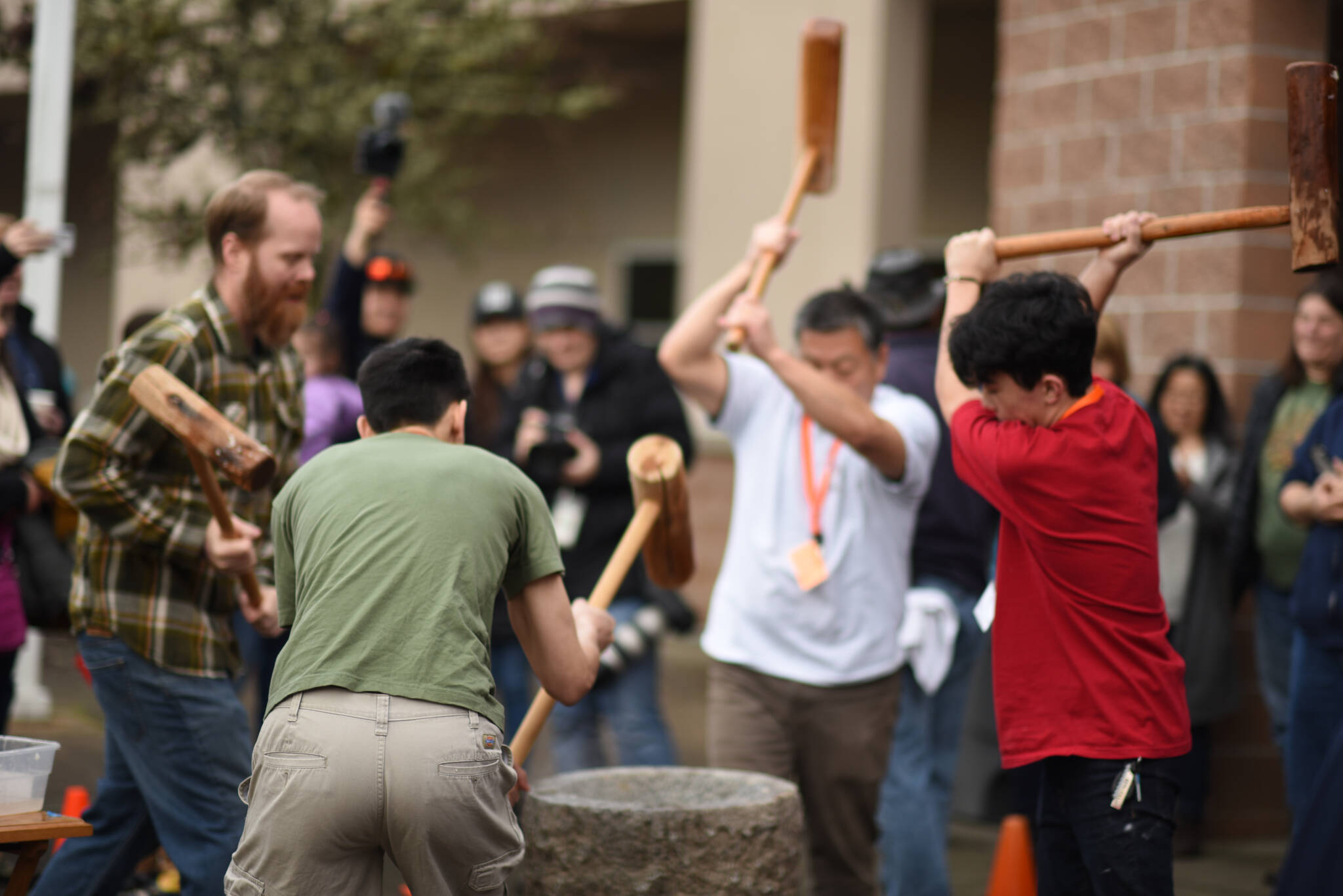Every January the Bainbridge Island Japanese American community celebrates the annual Mochi Tsuki festival with the making and eating of sweet rice cakes to wish for happiness, prosperity and good health in the new year.
With the COVID-19 pandemic still a threat to public health, the traditional sounds of taiko drums and wooden mallets pounding on sweet rice may have fallen silent, but BI carpenter Mike Okano has been making a lot of noise in his workshop preparing new mallets for a return to the next in-person celebration.
“We’re missing out on so many things, but we’re looking ahead to when we can do it again,” Okano said.
This year, the virtual Mochi Tsuki event is available online at their website at www.bijac.org and runs through Jan. 31.
Mochi Tsuki is normally celebrated between Christmas and New Year’s to usher in the new year. It’s an important holiday in Japanese culture and for islanders, too. It’s a time for families to reflect on the past year, make wishes for the future and to get some exercise while pounding rice with heavy wooden mallets to make the time-honored mochi treats.
It’s not for the faint of heart. “Some of the mallets are heavy — really heavy,” Okano said.
Okano grew up at the center of Mochi Tsuki history here, ever since his stepmother and father invited family and friends to the family-owned dry cleaning business to celebrate the New Year more than 40 years ago. His father put together a rice steamer out of a metal garbage can and used a steam line from inside the shop to keep the rice warm. “Believe it or not, that was pretty smart,” Okano said.
From that humble beginning, the BI Mochi Tsuki event has become the largest celebration of its kind in the Northwest. Okano, a self-described “walking history book” of Mochi Tsuki knowledge, finds himself the keeper of the usu, a 300-pound granite bowl used for mashing the hot rice into a smooth dough, and dozens of wooden mallets, called “kine” in Japanese.
For years, this popular community event moved from different halls around the island as attendance grew until planners found an ideal location at Woodward Middle School in 2020.
Okano said it was perfect for the last Mochi Tsuki event in 2020 with plenty of space for mochi pounding in the parking lot, room for historical displays in the cafeteria, and a large gymnasium for the taiko drumming performances.
Okano took over the family business until 2000 when fashion changed, leading to a declining need for dry cleaning and “wearing suits had gone out of style.” He took a year to figure out what to do next but he joined a friend’s building crew and loves being a carpenter.
“I love working with wood,” said Okano, who worked in the building trades for years until 2007 when he was injured in a motorcycle accident that nearly took his life and kept him convalescing in healthcare facilities for more than a year. Okano knows he’s lucky and says he “cheated death.”
Eventually, he got back to work. “Once I got out of the hospital, and I went through recovery, I was in pretty good shape,” he said.
Within a year and a half, Okano started his own business building decks and swinging hammers on woodworking projects for customers.
As he looks forward to the next year, Okano hopes to stay healthy. “The doctor says, I got one heck of a good strong heart. I just need to take care of myself.”
Okano said he’s grateful for the community, which donated money from a Mochi Tsuchi celebration to help pay his medical bills.
With an easy laugh and an optimistic outlook, Okano said one benefit of the pandemic is he’s had two years of much-needed rest from hosting the Mochi Tsuki. He’s also taking time to look for cherry wood.
“Back in the old days, they used cherry wood to make a new mallet every year,” Okano said. “To find cherry wood is almost unheard of because people don’t cut down cherry trees.”
He found a cherry tree at a worksite and is drying seven logs that will eventually make it onto the lathe in his workshop and become mallets to pound in the new year in 2023.
While making mallets is his current preoccupation, Okano looks forward to a return to normalcy when he and other community members can visit students at Sakai Middle School to share Japanese culture and stories of the Japanese American Internment experience during World War II.



